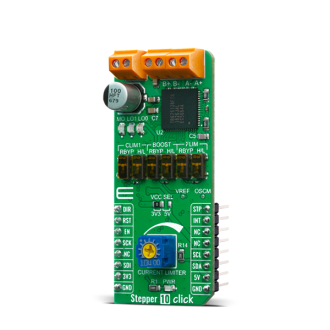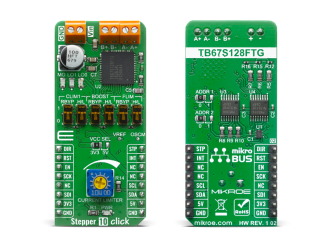
We strongly encourage users to use Package manager for sharing their code on Libstock website, because it boosts your efficiency and leaves the end user with no room for error. [more info]

Rating:
Author: MIKROE
Last Updated: 2020-06-29
Package Version: 1.0.0.0
mikroSDK Library: 1.0.0.0
Category: Stepper
Downloaded: 3505 times
Not followed.
License: MIT license
Stepper 10 Click is a two-phase bipolar stepping motor driver capable of controlling one stepper motor with PWM constant current drive. Click's featured chip TB67S128FTG, from Toshiba Semiconductor, fabricated with BiCD process with an output rating of 50V/5A and a built-in decoder can supply the motor with voltage of up to 44V.
Do you want to subscribe in order to receive notifications regarding "Stepper 10 click" changes.
Do you want to unsubscribe in order to stop receiving notifications regarding "Stepper 10 click" changes.
Do you want to report abuse regarding "Stepper 10 click".


Library Description
The library covers all the necessary functions that enables the usage of the Stepper 10 Click board. It initializes and defines the I2C driver and drivers that allow full control of the device to the user.
Key functions:
void stepper10_motor_start( void ) - Start Movementvoid stepper10_process ( void ) - Stepper State Machinevoid stepper10_motor_stop ( void ) - Stop MovementExamples description
The application is composed of three sections :
void application_task ( )
{
uint8_t status;
stepper10_motor_start( );
status = stepper10_get_run_status( );
while ( status == 1 )
{
status = stepper10_get_run_status( );
stepper10_process( );
}
stepper10_motor_stop( );
Delay_ms( 2000 );
}
Other mikroE Libraries used in the example:
Additional notes and informations
Depending on the development board you are using, you may need USB UART click, USB UART 2 click or RS232 click to connect to your PC, for development systems with no UART to USB interface available on the board. The terminal available in all MikroElektronika compilers, or any other terminal application of your choice, can be used to read the message.